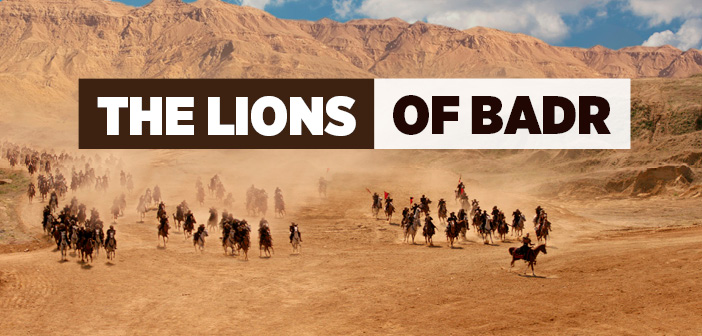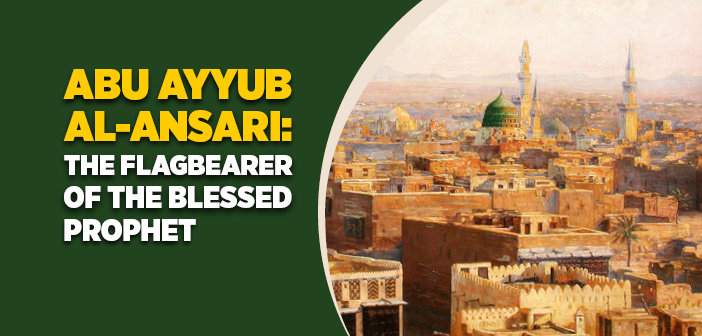What does the lions of badr mean?
Ali -Allah be well-pleased with him- has stated:
“On the day of Badr, we were taking refuge in the Prophet of Allah -upon him blessings and peace-. He stood closest to the enemy, and was by far, the bravest and most persistent of all men.” (Ahmad, I, 86)
Regarding the courage of the Noble Messenger -upon him blessings and peace-, Bara -Allah be well-pleased with him- affords a similar view:
“By Allah, whenever the battle would get fierce, we would seek refuge in the Messenger of Allah -upon him blessings and peace-. The next most courageous person in our eyes was him who was brave enough to stand in the same line as him.” (Muslim, Jihad, 79)
The Companions showed great heroism and sacrifice throughout the Battle. The dauntless Hamza -Allah be well-pleased with him-, ‘the Lion of Allah’, in particular, displayed a brilliant example of courage. Umayya ibn Khalaf later on asked Companion Abdurrahman ibn Awf of the identity “…of the man who wore an ostrich wing on his chest as a mark during the battle.”
“He was Hamza”, replied Abdurrahman; “Hamza ibn Abdulmuttalib”.
“Whatever it was that happened to us that day”, then remarked Umayya, “it was because of him.” (Ibn Hisham, II, 272)
In the footsteps of his uncle Hamza -Allah be well-pleased with him-, Ali -Allah be well-pleased with him-, too, showed great valor, knocking out one idolater after another.[1]
Repeating verses of rajaz[2] on horseback, Abu Jahl was claiming to be impervious to any attempt of taking revenge from him, in any battle, arrogantly boasting, “I was born for days like this!” (Ibn Hisham, II, 275)
Abdurrahman ibn Awf -Allah be well-pleased with him- recounts:
“On the day of Badr, I looked to my right, then left, and saw that I was amid two Ansari youngsters, when in fact I would have preferred to be between stronger men. One of them, without making it audible to the other, asked me if I knew Abu Jahl.
‘Yes, I do” I replied. ‘What about him?’
‘From what I heard, he apparently used speak ill of the Messenger of Allah! By Allah, in whose Hand of Might my life resides, if I see him, I will not part ways with him until one of us is killed!’
I was stunned by his words. The other youngster then spoke in a similar manner. I suddenly felt enormous satisfaction to be shoulder to shoulder with these youngsters. After the battle got under way, I spotted Abu Jahl, circling the battlefield on horseback. I turned to the youngsters and said, ‘There he is…The man you are after!’
Hearing me, they drew their swords and ran towards Abu Jahl. After a brief scuffle, Abu Jahl ended up slain. The youngsters, as I later found out, were Muadh ibn Afra and Muadh ibn Amr.” (Bukhari, Maghazi, 10; Muslim, Jihad, 42)
Muadh ibn Amr -Allah be well-pleased with him- retells the incident:
“As I thrusted my sword into Abu Jahl and gave him a fatal blow, his son Iqrimah struck me, all but severing my hand. It was left hanging merely on a skin! For the entire day, I continued fighting with my hand dangling behind me but it made it really difficult for me to fight. Once it got too uncomfortable, I stepped on it with my own foot, and severing completely, threw it aside!” (Ibn Hisham, II, 275-276)
In the aftermath, the Blessed Prophet -upon him blessings and peace- wondered about the whereabouts of Abu Jahl and sent Abdullah ibn Masud -Allah be well-pleased with him- to look for him. He found Abu Jahl lying on the ground. The conversation that followed is retold by Abdullah ibn Masud -Allah be well-pleased with him- himself:
‘Enemy of Allah…Allah has surely disgraced you and put you to shame, hasn’t He?’ I asked him as he lay in front of me.
‘Disgraced me and put me to shame…with what? Show me another person superior to me from among all the men your people have killed today!’ he replied, having lost nothing of his arrogance. Then making reference to the fact I had my foot placed on his chest, remarked, ‘You have reached a tough peak to climb, shepherd!’ After a brief pause, he asked, ‘Anyway, tell me…Who won today?’
‘Allah and His Messenger…!’ I said. Then, without further ado, I put him out of his misery with his own sword. Afterward, I made my way back to the Prophet of Allah -upon him blessings and peace- and told him I had killed Abu Jahl. He thanked and praised Allah, glory unto Him, and said:
‘He was the Pharaoh of this ummah!’ (Bukhari, Maghazi, 12; Ahmad, I, 444; Ibn Hisham, II, 277; Waqidi, I, 89-90)
Ummu Haritha’s son was martyred at Badr with a random, stray arrow flung from the enemy ranks. She came to the Prophet of Allah -upon him blessings and peace- and said:
“If my son Haritha is in Paradise, Messenger of Allah, I will keep patient and anticipate its reward; but if not, I will cry my eyes out for him!”
She was, however, consoled by the wonderful words of the Noble Messenger -upon him blessings and peace- .
“There are many ranks in Paradise, Ummu Haritha; and your son has attained the highest of them, Firdaws’ul-A’la.” (Bukhari, Jihad, 14; Ahmad, III, 272)
As she was returning, Ummu Haritha had a radiant smile on her face, as she was saying to herself:
“Just look at what Haritha has been given!” (Ibn Athir, Usd’ul-Ghaba, I, 426)
Since it was a cut throat battle of do or die for the survival of Islam, the fortunate Companions who took part in the first major battle that was of Badr are, at the same time, privileged with the honor of being the most virtuous of all Muslims. Likewise, the angels mobilized by the Almighty for this battle, who took part in that inimitable wave of iman inspired enthusiasm, have attained an honor superior to other angels, as attested by the conversation between Jibril -upon him peace- and the Blessed Prophet -upon him blessings and peace-.
When asked by Jibril -upon him peace- how he regarded those who took part in Badr, the Blessed Prophet -upon him blessings and peace- responded by saying, “We regard them as the most virtuous of all Muslims!” To this Jibril -upon him peace- replied by saying something similar:
“We, too, consider the angels to have taken part in Badr as the best among all angels!” (Bukhari, Maghazi, 11)
The battle ended towards noon with a decisive Muslim victory. All up, fourteen Muslims were martyred, in contrast to which seventy idolaters, including Abu Jahl, had met their doom on the field. As courageous as they were in showing face at the field of Badr, the hapless idolaters nonetheless ended up drinking not the wine of victory as they had desperately hoped, but the venom of a miserable death. Instead of singing, their slave-girls mourned their deceased. Far from filling their appetites with the spoils they dreamt of seizing prior to a victory that was never to be, the idolaters instead ended up filling the pits of Hellfire.
Donned in his armor, the Blessed Prophet -upon him blessings and peace- made his way out of the shade, reciting:
“Soon shall the hosts be routed, and they shall turn (their) backs.” (al-Qamar, 45), regarding which Omar -Allah be well-pleased with him- said:
“When that ayah was revealed –and it was revealed in Mecca-, I wondered which hosts would end up being routed and defeated. But come the day of Badr, when I heard the Messenger of Allah -upon him blessings and peace- recite it, I realized it was Quraysh who were the group prefigured to suffer a routing. For me, the meaning of the ayah transpired that day.” (Ibn Sad, II, 25; Ibn Kathir, al-Bidaya, III, 312)
In providing commentary for the ayah:
“Have you not seen those who have changed Allah’s favor for ungratefulness and made their people to alight into the abode of ruin?” (Ibrahim, 28), Ibn Abbas -Allah be well-pleased with him- has stated:
“By Allah, the reference there is to the idolaters of Quraysh. The grace returned with unthankfulness is no other than the Messenger of Allah -upon him blessings and peace-. The abode of ruin to which they steered their people is the fire to which they dragged their people at Badr.” (Bukhari, Maghazi, 8; Tafsir, 14/3)
The Battle of Badr, culminating in the triumph of Islam and iman, is replete with great instances bearing out how Allah, glory unto Him, aids His genuinely pious and sincere servants.
Following the massive victory, to prevent the Believers from getting carried away in a state of self-importance (ujub), Allah, glory unto Him, revealed the following:
“So you did not slay them, but it was Allah Who slew them, and you did not smite when you smote (the enemy), but it was Allah Who smote, and that He might confer upon the believers a good gift from Himself; surely Allah is Hearing, Knowing.” (al-Anfal, 17)
The power exercised by man is strictly within Divine Power (taqdir), owing to which it has been declared that ‘no-one has power apart from the Glorious and Exalted Allah’. What existent beings possess -beings which although did not exist in past-eternity have come to being solely through the grace and benevolence of Allah, glory unto Him- is from the Almighty. Thus the Universal Will of Allah, glory unto Him, encompasses and comprises all creation and occurrences. This means that the origin of will and power is in the Almighty. Yet because human beings have been sent into this world as part of a test, they have been endowed with a particular will and an aptitude for good and evil. Actualizing this aptitude through practice has been left to their will.
[1] Ibn Athir, Usd’ul-Ghabah, IV, 97.
[2] Rajaz is a name given to a bahir in Arabic prosody. Literally, it means to ‘quiver’, and its rhythm resembles a rajza, or a she-camel –hence the name-, which, from being overly delicate, quivers when rising. Rajaz also means to ‘roar’, in which the case the name could have been derived from the roar-like singing of battle anthems, for which rajaz has been preferred. (Cehande, A.-Çetin, N. Milli Eğitim Bakanlığı, İslam Ansiklopedisi, “recez” entry, IX, 657) The rhythmic and accented meeting therein of a slow and fast tempo enables it to be performed by a host of different instruments, evoking thereby the rallying of a variety of feelings. Making possible the expression of both joy and sorrow, rajaz is moreover said to contain around fifteen sub branches. (Tahir’ul-Mevlevi, Edebiyat Lügati, p. 120, “recez” article.)
Source: Osman Nuri Topbaş, The Prophet Muhammed Mustafa the Elect II, Erkam Publications





